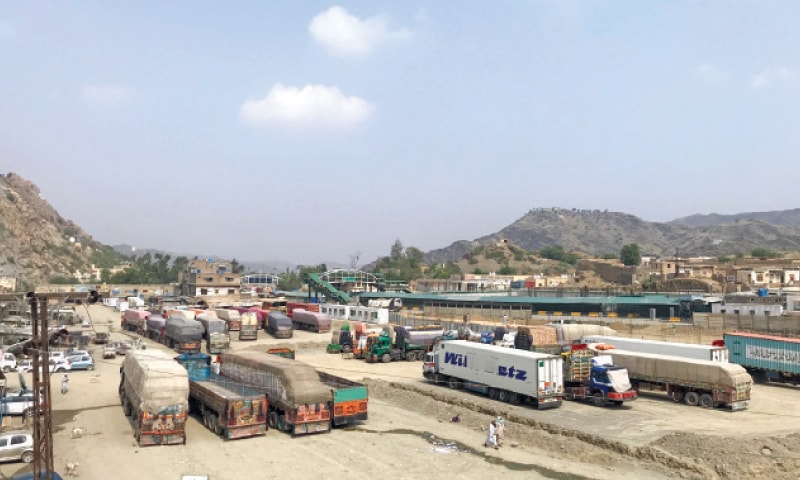KHYBER: Most Pakistani exporters have delayed the supply of goods to Afghanistan via Torkham border since the Taliban’s takeover of the country.
Traders and custom clearing agents at the Torkham border crossing told Dawn that the country’s exports to Afghanistan had reduced due to uncertainty and fears caused by a delay in the formation of the new government in Kabul.
“It’s a complete chaos in Afghanistan. We don’t expect a permanent and secure business strategy from the Afghan Taliban, who seized Kabul early last week after nearly all of the country,” exporter and custom clearing agent Mujeebur Rehman told Dawn.
Pakistanis delay goods delivery fearing losses in uncertain Afghan situation
He said almost all banks, currency exchange markets and business centres were closed in major Afghan cities, including Kabul, so it was not possible for Pakistan exporters to deliver the consignments already booked for Afghanistan and take fresh orders for fear of losses.
“Transactions through banks and other informal channels have completely halted since the Afghan Taliban entered Kabul,” he added.
He said most local traders had yet to make any contact with Afghan buyers as a majority of them had either gone into hiding or were unwilling to accept new consignments despite advance payments.
“Full-fledged trading activities will resume only after the new administration in Kabul announces its trade policy and custom duties for Pakistani exporters,” he said.
The custom clearing agents also said Pakistani exports to Afghanistan had declined in the recent days as the exporters awaited the new Afghan trade and custom clearing policy.
Custom clearing agent Jamshed Khan told Dawn that the export of cement, rice, fresh fruits and vegetables, and miscellaneous goods to Afghanistan had declined since the Taliban seized Kabul’s control.
He, however, said the number of vehicles bringing in fresh fruits and vegetables from Afghanistan via Torkham border had increased in the recent days as the Taliban had allowed all loaded and empty vehicles stranded on their side of the border to enter Pakistan.
Jamshed Khan claimed that the imports of coal, sulphur, chromite and pulses from Afghanistan had come to a halt.
The customs officials at Torkham said their employees were there to facilitate cross-border trade despite a recent slump.
They, however, said trading activities at Torkham would remain below average until a government was formed in Afghanistan.
The officials said most Pakistani traders were not ready to take risk at the current uncertain situation in Afghanistan as many Afghans were on the run for own safety while caring little for their businesses.
Afghan trailer driver Mutabar Khan told Dawn that the reluctance of Pakistanis to export goods to Afghanistan had brought freight charges down considerably.
He said he had unloaded his trailer loaded with cement in Kabul prior to the Taliban’s control of the city but still awaited the payment of freight charges.
“I am thinking about parking my vehicle at my house until the situation in the country improves and trading activities are restored,” he said.
The driver said he had come to Pakistan to find an alternate source of earning for the time being.
Meanwhile, over 6,000 Afghan nationals have returned since August 18.
Officials said on average, around 1,000 Afghans, both men and women, went to their country daily after the immigration and Nadra offices at Torkham cleared their travel documents.
They said 112 Pakistanis also returned from Afghanistan via the Torkham border crossing during the period.
Published in Dawn, August 25th, 2021














































